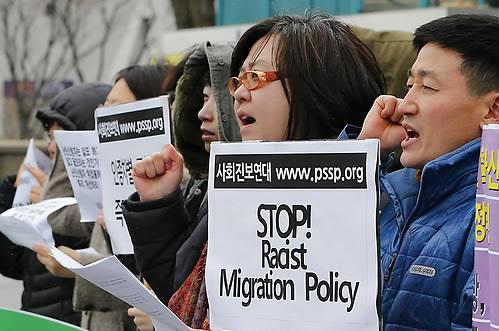- California Assembly OKs highest minimum wage in nation
- S. Korea unveils first graphic cigarette warnings
- US joins with South Korea, Japan in bid to deter North Korea
- LPGA golfer Chun In-gee finally back in action
- S. Korea won’t be top seed in final World Cup qualification round
- US men’s soccer misses 2nd straight Olympics
- US back on track in qualifying with 4-0 win over Guatemala
- High-intensity workout injuries spawn cottage industry
- CDC expands range of Zika mosquitoes into parts of Northeast
- Who knew? ‘The Walking Dead’ is helping families connect
[UPI] S. Korea’s population becoming more diverse, but tolerance lagging
Hundreds of migrant workers, some working without visas, gathered in central Seoul on March 20-21 to protest poor treatment and lack of compensation for work-related injuries. March 21 is the U.N.-designated International Day for the Elimination of Racial Discrimination. (Yonhap)
SEOUL, April 8 (UPI) — As South Korea’s population becomes more multicultural with a steady influx of foreigners seeking jobs, South Korean society is facing the prospects of becoming more ethnically diverse.
But with more racially mixed marriages and the election of the nation’s first foreign-born member of parliament, the changing demographics give rise to questions of discrimination and workers’ rights.“There’s negative perception regarding multiculturalism,” said Jasmine Lee, 37, a Filipino who became the first foreign-born member of South Korea’s National Assembly in 2012. “Even in Europe, [Koreans say] multiculturalism has failed, so why would a small country like South Korea succeed?”
Many natives have opinions of migrants that range from negative to indifferent. Lee’s election brought out the negative in force, especially online. Tweets derided her foreign origins, and many jeered the financial perks of a high-level job going to a non-Korean.
Even now, three years later, it’s still tough.

















